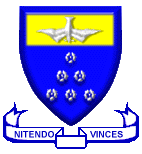
EXTRACURRICULAR
Football
Cricket
Hockey
Swimming
Basketball
Scrabble
Chess
Sea Scouts
Steel Orchestra

Adapt, Improvise and Overcome
The Trinidad & Tobago Cadet Force (TTCF) was established on May 10th, 1910. The Cadet Force, then known as the Cadet Corps, comprised two units, one from Queen's Royal College and the other from St. Mary's College (CIC). Later, other units were formed at other schools across the country.
The Fatima College Cadet Unit (TFCCU) came into being in 1947, a mere two years after the inception of the College. The Fatima College Cadet Unit became one of the core units within the TTCF. Some of the Unit's past commanders included Lt. W. Delavive, Capt. J.D. Andrews and Capt. P.I. Klinter Roach. The present commander is Lt. C. Sampson.
Structure of the Cadet Force
The units of the Trinidad and Tobago Cadet Force are divided into five geographical locations: North One and North Two, which include Port Of Spain and environs; North East; South and Tobago. The Fatima Unit is in the North One region.
When one joins the Cadet Force, he/she is called a recruit and undergoes three months of rigorous training. After an exam, he/she becomes a cadet. The highest rank obtainable by a 'school' boy is Company Sergeant Major (CSM) in a maximum of eight years. Any person can however, join the Cadet Force in the 'adult' ranks from the age of eighteen and progress to being a Warrant Officer or an Officer, of which the highest rank attainable is Lietenant-Colonel (Lt./Col.). The Commandant of the Cadet Force is Lt. Col. Zeno Crepin.
Some of the Rules of The Cadet Force
Because the Cadet Force is a paramilitary organisation, some military standards are expected of each cadet. Such as..
- Hair is to be kept low and well groomed.
- The moustache (if any) is to be well trimmed.
- Sideburns and beards are not allowed.
- Whether in cadet or school uniform or in mufti (civilian wear) a cadet's attire is to be of a high standard.
These rules, along with expected deportment of each cadet, is not to train him to be a soldier, but to teach him to have a high standard of himself of which he would be proud of, and which would be fully accepted in the adult world.
The cadet is also expected to be present and punctual for all related activities, whether it is training, a parade, or a friendly football match. The senior ranks must always set the example for the junior cadets, in deeds and in manerisms.
Activities
The cadet is expected to be present for every training day, usually designated on Saturdays. This is the only way in which he can gain the training he needs to participate in the activities of the Force.
- Parades
After the recruit has finished his/her training, lasting usually three months, he will experience his first parade, his "Passing Out Parade". After this he is officially a member of the Cadet Force. He can look forward to other activities and parades, such as the Annual Church Parade on the much anticipated Independence Day Parade. - Hikes
To continue the cadet's training, a hike may be planned to test his/her practical abilities and competence. The length and duration of a hike depends on the cadet's level of training. Star Exams - Range
Every cadet looks forward to proving his marksmanship skills, learn in training, at different rifles on the range. - Camps
During the Christmas and Easter vacations, an area may have an Area camp in which the units of the area practice their skills in a fully military environment for a week or two. At the end of the school year, there is always an Annual Training Camp (ATC) where the whole Cadet Force camps together. Some cadets, however, will prefer to camp abroad with cadets of another Caribbean country. - Special Training
Cadets of a high proficiency may undergo other training courses, e.g. Rappelling, Firefighting and Advanced First Aid Training.
These are exams, written and practical, used to test the cadet in different subject areas, e.g. use of Map and Compass, Drill. The cadet raises a star level upon passing all of the exams of a given star, with one as the lowest and four as the highest.
Achievements
- In 1997, Lt./Cpl. S. Serrette placed second in his age group at the Trinidad & Tobago Cadet Force Annual Road Race.
- In 1997, Cdt. A. Burke placed first at the Trinidad & Tobago Cadet Force Elimination Drill Competition.
- In 1998, the Fatima Cadet Unit placed second at the Annual Orienteering Competition.
Copyright © Fatima College 1996-2000.